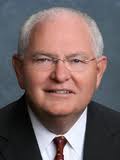Charter schools. The Pembroke Pines Charter Schools system, which recently cut teacher pay, is asking parents to pay $1,000 per student per year to restore the system's reserves. South Florida Sun Sentinel. Gov. Rick Scott signs the bill boosting accountability for charter schools. Orlando Sentinel.
 Common Core. FEA President Andy Ford says too much testing could sour the public on it. StateImpact Florida.
Common Core. FEA President Andy Ford says too much testing could sour the public on it. StateImpact Florida.
School grades. Tony Bennett meets with the school grades task force, which includes a number of superintendents, but says he won't make changes just to soften the blow of bad grades. Orlando Sentinel, Tampa Bay Times, StateImpact Florida, Palm Beach Post, News Service of Florida, Tallahassee Democrat.
Dual enrollment. Tony Bennett says districts and state colleges need to better collaborate in the wake of the Legislature's decision to shift costs to districts. Gradebook.
Parent power. The Pensacola News Journal writes up the new law that gives more power to parents of students with disabilities.
Superintendents. Duval's Nikolai Vitti: "Folks here know that public education can be better. And they’re willing to put their shoulder to the wheel to make it better." StateImpact Florida.
Teachers unions. The Broward union wins an arbitration case involving changes to the high school schedule. South Florida Sun Sentinel, Miami Herald.
Tardiness. Alachua looks for ways to crack down on chronic tardiness. Gainesville Sun.
School spending. Walton will consider upping the millage rate for capital improvements. Northwest Florida Daily News.
There are endless reasons why parents consider charter schools, but here’s a fresh one from Florida: The local school district is neck-deep in financial problems.
Rowlett Magnet Elementary, a popular A-rated school in Bradenton, is caught in a districtwide crisis that has resulted in a spending freeze until July and threatens to leave administrators little choice but to drop programs to cut costs.
Instead of losing classes devoted to drama, film-making and music, Rowlett’s leaders are vying for a shot at running the school independent from the Manatee County school district.
“I really can’t say that I blame them for wanting to leave,’’ school board Chairwoman Karen Carpenter told redefinED this week. “They want some determination over their future.’’
Many of the district’s problems appear to be self-inflicted. Superintendent Tim McGonegal resigned last fall as questions mounted over accounting errors that led to a $3.4 million budget deficit. A scathing audit later concluded a lack of oversight was part of the problem. A citizens’ advisory group pointed to dysfunction on the school board.
Florida is no stranger to charter school conversions, with 20 district schools making the leap since the first one in Lake County in 1997. If its charter school application is approved, Rowlett would become the first conversion charter school in Manatee, though, where 4,500 of the district’s more than 44,000 students attend one of 12 charter schools.
The school is in an “exploratory and fact-finding phase’’ right now to determine if the conversion is a viable option, according to a prepared statement from the Manatee County school district.
Conversions aren’t easy. Teachers and parents have to vote on the switch, with a majority of parents taking part in the vote. Support must come from a majority of teachers and a majority of parents.
The school’s advisory committee chairwoman has already asked in writing – as required by law - for Rowlett’s principal to start the balloting process. The vote is set for this month. (more…)

A school choice rally in Greensboro, N.C. this week drew more than 2,000 people. They were there to show support for a school voucher bill that will be considered in this year's legislative session. (Image from Parents for Educational Freedom in North Carolina.)
There were 1,000 in Tallahassee, Fla., 2,000 in Columbus, Ohio, 2,400 in Greensboro, N.C. and 10,000 in Buffalo, N.Y. And that’s just in the past few weeks.
From coast to coast, swarms of parents are showing up at school choice rallies for charter schools, vouchers, tax credit scholarships or all of the above. They’re not angry like the Tea Party or Occupy. They don’t have defiant flags or frayed tents (yellow scarves maybe :)). But they’re just as passionate and far more diverse.
“I want to be able to have a choice for where my daughter can go to schools,” one New York City mom said at a rally last summer. “I don’t want that choice made for me.”
That rally drew 5,000.
In the past year, one in Chicago drew thousands, as did one in Indianapolis. One in Atlanta drew 1,500. One in Boise drew nearly 1,000. One in Los Angeles drew 1,000. Another in Los Angeles drew 5,000.
In Pembroke Pines, Fla., nearly 1,000 showed up earlier this year to demand equal funding for charter schools.
Critics say Astroturf. Perhaps saying it enough has tamped down press coverage.
But people don’t take time out for these kinds of things if they’re lukewarm. There’s something happening here, and all those blips on the radar aren’t about to fade.
Kristopher Pappas, a sixth-grader at Orlando Science School, looks like a lot of 11-year-olds, like he could have a Kindle and a Razor and put a little brother in a headlock. But Kristopher says he wants to be a quantum mechanic, and with a blow dryer and ping pong ball, he proves he’s not an idle dreamer. He turns on the blow dryer and settles the ball atop the little rumble of air stream, where, instead of whooshing away, it shimmies and floats a few inches above the barrel. The trick is cool, but it’s Kristopher’s explanation that fries synapses. “You got to give Bernoulli credit,” he begins.
Bernoulli?
As a whole, Florida students don’t do well in science. The solid gains they’ve made over the past 15 years in reading and math haven’t been matched in biology, chemistry and physics. But schools of choice like the one in Orlando are giving hope to science diehards.
Orlando Science School is a charter school, tucked away in a nothing-fancy commercial park, next to a city bus maintenance shop. Founder and principal Yalcin Akin has a Ph.D in materials engineering and did research at Florida State University’s world-renowned magnet lab. His school opened in 2008 with 109 sixth- and seventh- graders. Now it has 730 kids in K-11 and serious buzz as the science school in Orange County, the 10th biggest school district in the nation. Only 26 schools in Florida can boast that 80 percent of their eighth graders passed the state science test last year (the test is given in fifth and eighth grades). At least two thirds were magnets or charters. Orlando Science School was one of them.
The kids are “constantly challenged, which is what you want,” said parent Kathi Martin. One of Martin’s daughters is in ninth grade; the other is in seventh. Mom wasn’t excited about the neighborhood school; the science magnets were too far away; the private schools didn’t feel like home. During a visit to Orlando Science School, she said, something clicked.
It’s “a school where it’s cool to be a nerd,” she said.
In 2006, the Orange County School Board denied the charter’s application. The state approved it on appeal.
Last year, 1,500 kids were on the waiting list. Last month, Orlando Mayor Buddy Dyer paid a visit.
“This is about word of mouth,” said Tamara Cox, the mother of eighth-grader Akylah Cox. “The parents recognize the value of what’s going on at OSS. That’s why there is such a need and such a calling for it.”
For every bad story about charter schools in Florida, several good ones go untold. (more…)
If you think the school choice debate in Florida is all us vs. them, maybe you’re not listening carefully enough. Here are three examples just from the past few days.

Sen. Montford: "We know that the vast majority of charter schools in the state have done a good job."
At Monday’s Senate Education Committee meeting, Sen. Bill Montford, a Democrat who heads the state superintendents association, introduced a bill that would give school districts the freedom and flexibility to create charter-school-like “innovation schools.” Along the way, he said this:
“We know that the vast majority of our charter schools in the state have done a good job. Usually what you hear of is those who don’t. But that’s like any – in public school, you hear about the bad stories. But we’ve learned a lot over 15 years. The charter schools have set the pace, if you will, for a lot of innovations and creative efforts. And they’ve been able to do that because they’ve been allowed to be creative. They haven’t been burdened quite frankly with some of the state rules and statutes.”
The only member of the public to comment at the hearing was Jim Horne, a former education commissioner under Jeb Bush who now heads the Florida Charter School Alliance. Both the alliance and Associated Industries of Florida, for whom he lobbies, support the bill, he told the committee. Then he said this:
“This is sort of a great partnership where we can benefit from what we’ve learned. We know charters started 15 years ago to be innovative, free from some of the bureaucracy. And we think districts ought to have that same opportunity, to be able to innovate and be able to be creative outside of the bureaucracy and some of the regulations that we hear choke innovation.”
The bill passed unanimously. But neither Montford nor Horne’s comments made the papers, which is too bad. Their positions not only made sense, but cut against the stereotypes that dog both the “education establishment” and the “school choice crowd.” Beyond the political theater, there’s a lot of that going on.
Here’s another example. The Ledger reported Tuesday that the Polk County School District may convert an elementary school and a middle school in Lake Wales into a K-12 arts magnet. The two schools are the only ones in Lake Wales that are not part of that community’s charter school system. So how did the charter system respond? (more…)

More than 1,000 school choice supporters from across Florida rallied at the Capitol in Tallahassee Wednesday, in an event that for the first time represented just about every school choice sector.
The parents and students came from magnet schools, career academies, virtual schools, charter schools, home schools and private schools that accept vouchers and tax credit scholarships.
Among their messages: Options matter.
"If your child was in the same situation and he's not progressing, you have to do what you have to do," said Eboni Tucker-Smith, who used a McKay voucher to put her son Daquan in an Orlando private school after he struggled in public school. "Now he's doing great. He started opening up, singing. It brought tears to me."
"It's working," she continued about school choice. "Leave it alone."
No, don't leave it alone, said Regina Davis, who has three children in Miami-Dade magnet schools. Expand it.
"I don't want to be forced to put my child anywhere," said Regina Davis, who boarded a bus at 3 a.m. to make the rally. "If we can't get the school system to provide a high-standard education, we're going to do whatever it takes."
In less than a generation, school choice in Florida has quietly gone mainstream, with 43 percent of students now attending a school other than their neighborhood school. This year alone, more than 200,000 parents chose magnet schools, at least 150,000 chose career academies, 200,000 chose charters, and 50,000 chose tax-credit scholarships to send their kids to private schools.
Many at the rally said they appreciated the growing list of options, but some said there still weren't enough. (more…)
 New York: More than 1,000 charter school parents rally in Albany to convince the state to let charter schools compete for state funding for pre-K (Fox23 News).
New York: More than 1,000 charter school parents rally in Albany to convince the state to let charter schools compete for state funding for pre-K (Fox23 News).
Montana: Lawmakers hear from parents and other child advocates who want their state to open charter schools and support giving families more choices, such as tax credits (Great Falls Tribune). Bills to create a tax credit scholarship program pass out of committees on mostly party line votes (Helena Independent Record). More from the Billings Gazette.
Ohio: Half the students in the state would be eligible for private school vouchers under an expansion proposed by Gov. John Kasich to include all low-income children (ClevelandLeader.com).
Texas: House Speaker Joe Straus warns the Senate that it might not want to go "full bore'' on a school voucher bill, calling it an "exercise in futility'' (Dallas Morning News). Four groups aiming to open charter schools next year turn in applications that have material copied from other applications (Dallas Morning News).
Florida: The Florida House approved a bill that makes it easier for charter schools to grow, but calls for increased accountability (redefinED). The bill also gives charters greater access to district facilities, something one school official said would be a "logistical nightmare" (Palm Beach Post). More from Tallahassee Democrat. Private schools can apply to administer the FCAT, but, so far, only two have (Orlando Sentinel). (more…)
Tony Bennett. On his first day on the job, he meets with superintendents and the Florida Association of District Administrators and says he is an “unapologetic advocate for school choice,” reports the Tallahassee Democrat. More from The Buzz. His first comments on the “Commissioner’s Blog” here. Interview with StateImpact Florida.
Charter school funding. More than 1,000 people turn out for a meeting called by Pembroke Pines charter parents to demand equal funding for charter schools, reports the South Florida Sun Sentinel.
School spending. If the Broward school district wants to get the money to repair old schools, it will have to restore trust with voters and overcome a “long and lousy history of stunningly bad behavior,” editorializes the Miami Herald: “The district has been plagued by cronyism, mismanagement and a culture of dishonesty. In a scathing grand jury report released almost two years ago, jurors said they found the district so thoroughly corrupt, so reckless in its spending of taxpayers’ money, they would have recommended abolishing the school board completely if the state Constitution didn’t require its existence.” In Manatee, a forensic audit finds “incompetency -- not criminal or illegal activity -- caused a $3.4 million budget deficit that rocked the public trust,” reports the Bradenton Herald. More from the Sarasota Herald Tribune.
School prayer law. “For the Satanists, it was a godsend,” writes Palm Beach Post columnist Frank Cerabino.
Cold water on the party. Former state Sen. Dan Gelber says there isn’t much for Florida to celebrate in the latest Education Week rankings. Florida Voices.
Murmurs. School administrators wanted to hear more from Gov. Rick Scott, writes Tampa Bay Times columnist Steve Bousquet.
Merit pay challenge. A hearing on the FEA’s challenge of SB 736 is set for Wednesday in Leon County Court. SchoolZone. (more…)
California: 1,000 charter school parents and administrators rally to protest a proposed moratorium on charter schools (Los Angeles Times). The school board subsequently votes down a measure aimed at more oversight (Los Angeles Times). The school board at the center of the parent trigger fight could see turnover (Education Week).
Florida: Charter school supporters make a pitch for equitable funding and independent authorizers (redefinED). Charter school enrollment now tops 10 percent of total public school enrollment in eight Florida districts, a new report shows (redefineED). In the wake of Tony Bennett's defeat in Indiana, Jeb Bush's Foundation for Excellence in Education pushes back against Common Core critics (redefinED).
Tennessee: Gov. Bill Haslam's task force finalizes its recommendations for a statewide voucher program, agreeing it should be limited to poorer students (timesfreepress.com). More from The Tennessean and the Memphis Commercial Appeal.
Washington: The Seattle Times says the charter school ballot initiative has passed, even though opponents have yet to concede. Spokane Public Schools officials say they want to open a charter school (Huffington Post).
Illinois: Public school officials in Chicago plan to shut down poor-performing charters (Chicago Tribune).
Georgia: One of the state's bigger school districts considers creation of a full-time virtual school (Gainesville Times).
Colorado: Douglas County's voucher program heads back to court today, with both sides battling over a lower court ruling that it's unconstitutional (Denver Post).
I was a news reporter for 20 years. I appreciate what good journalists do. But I’m often perplexed by the selective scrutiny that permeates so much education coverage in Florida, particularly when it comes to school choice issues.
The latest example: An “investigation” by an Orlando TV station into the "cozy connections" between Florida state lawmakers and rapidly expanding charter schools. WFTV-Ch. 9 raised conflict-of-interest questions this week about lawmakers who work for charter schools and who have backed legislation that generally promotes charter expansion. It singled out incoming House Speaker Will Weatherford, R-Wesley Chapel; Rep. Erik Fresen, R-Miami; and John Legg, R-New Port Richey, a state rep headed to the state senate.
First off, this is old news. The ties between all three lawmakers and charter schools have been well publicized. In fact, they were among a bigger handful of lawmakers cited last December in a front-page Tampa Bay Times piece on the same issue. Curiously, the TV station kicked off its story with the same anecdotal lead as the Times did, one involving Legg and the Pasco County School Board.
More important, the station neglected to mention that a number of other lawmakers have strong if not direct ties to school districts. Sen. Bill Montford, D-Tallahassee, heads the state superintendents association. Former state rep and now Sen. Dwight Bullard, D-Miami, is a public school teacher and local union rep. Two newly elected Democratic state reps, Mark Danish in Tampa and Karen Castor Dentel in the Orlando area, also teach in district schools. Should teacher-lawmakers be voting on state budgets that could affect how much they’re paid? Should they vote on legislation that could impact how they’re evaluated? (more…)